Avoid getting scammed by fake "Windows protected your PC" websites
Phishing/ScamAlso Known As: "Windows protected your PC" virus
Get free scan and check if your device is infected.
Remove it nowTo use full-featured product, you have to purchase a license for Combo Cleaner. Seven days free trial available. Combo Cleaner is owned and operated by RCS LT, the parent company of PCRisk.com.
What is "Windows protected your PC"?
"Windows protected your PC" is the name of a tech-support scam promoted using a deceptive website. Like most of these scam websites, it often tricks people into believing that they need to contact scammers who pose as 'technicians', since the computers are supposedly infected and blocked. These websites cannot be trusted and the best option is to ignore and close them.
They are usually opened by potentially unwanted apps (PUAs) installed on browsers or computers. People do not generally visit these scam websites intentionally.
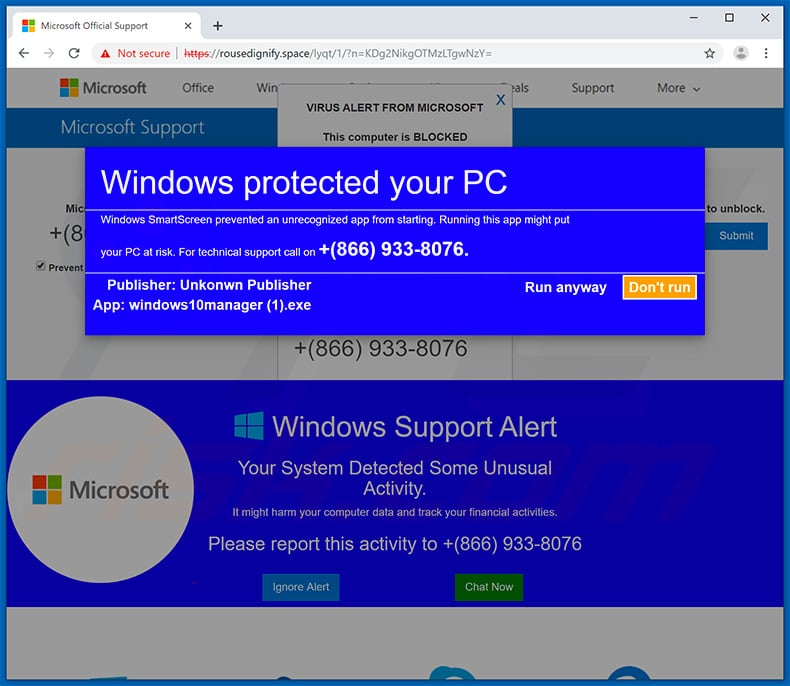
"Windows protected your PC" scam overview
When visited, this website displays a pop-up window presented as a virus alert from Microsoft stating that the visitor's computer is blocked. It encourages users not to close it or to restart their computers.
It is stated that the computer is blocked due to illegal software installed on the operating system, the system registration key is illegal, or the operating system has been hacked and is proliferating viruses. To "reactivate" their computers, users are encouraged to contact the Microsoft helpline via the +1-833-779-4992 number.
Another pop-up window (orange) states that Windows has protected the computer using the SmartScreen feature and has prevented an unauthorized application from running, which could cause damage. According to this pop-up, the application is called "windows10manger (1).exe".
Like the previous pop-up window, this one also encourages people to contact "technical support". Furthermore, it asks if the application can be opened. This is irrelevant, since none of this information should be trusted. This is a fake virus alert, a scam used to trick people into contacting the scammers who designed it. Ignore it and close the window.
If this cannot be done in the normal way, close the entire browser using Task Manager. The closed browsing session should not be restored, since this will reopen the scam website.
Scam websites are often opened by installed unwanted apps, which then cause redirects and deliver intrusive ads. The ads include coupons, banners, surveys, pop-up ads, and so on. If clicked, they open potentially malicious websites or run scripts designed to download and install or other unwanted applications.
Additionally, many PUAs gather browsing-related data. For example, IP addresses, entered search queries, URLs of visited websites, geolocations, and so on. Developers share the details with other parties who might be cyber criminals - they misuse the data to generate revenue. For these reasons, uninstall PUAs immediately.
| Name | "Windows protected your PC" virus |
| Threat Type | Phishing, Scam, Social Engineering, Fraud. |
| Fake Claim | The fake error claims that the system is supposedly blocked due to a number of reasons (usage of pirated software, illegal activation key, malware distribution, etc.) |
| Tech Support Scammer Phone Number | +1-833-779-4992, +866 933-8076, +1-833-724-6389, +1-888-206-1813, +1-844-295-6258 |
| Related URLs |
mjtcxx[.]club, rousedignify[.]space, adimportant[.]shop |
| Serving IP Address (mjtcxx[.]club) | 104.24.121.217 |
| Symptoms | Fake error messages, fake system warnings, pop-up errors, hoax computer scan. |
| Distribution methods | Compromised websites, rogue online pop-up ads, potentially unwanted applications. |
| Damage | Loss of sensitive private information, monetary loss, identity theft, possible malware infections. |
| Malware Removal (Windows) |
To eliminate possible malware infections, scan your computer with legitimate antivirus software. Our security researchers recommend using Combo Cleaner. Download Combo CleanerTo use full-featured product, you have to purchase a license for Combo Cleaner. 7 days free trial available. Combo Cleaner is owned and operated by RCS LT, the parent company of PCRisk.com. |
Similar scam examples
"Hard Drive Safety Delete", "Virus Support Alert", and "Windows Is Not Activated" are examples of just a few of these scam websites. There are many others. Typically, they are used to encourage people to contact scammers who then they try to sell dubious software or services. Their goal is to extort money from people in various ways.
The aforementioned PUAs also share many similarities. Most are presented as harmless tools, however, once installed, they cause unwanted redirects to scams such as "Windows protected your PC", feed users with ads, gather data, and so on.
How did potentially unwanted applications install on my computer?
Many users download and install PUAs unintentionally. These apps are installed through clicked ads or when software developers employ the "bundling" method to trick people into downloading/installing unwanted apps with other software. They hide bundled apps in "Custom", "Advanced" and other similar settings of the installation/download set-ups.
Developers do not provide information regarding the inclusion of apps into set-ups. Frequently, people grant permission for PUAs to be installed/downloaded simply by skipping software setup steps and leaving all available settings unchanged.
How to avoid installation of potentially unwanted applications?
Download computer software from trustworthy and official websites. Do not use Peer-to-Peer networks such as torrent clients, eMule, various untrustworthy websites and other sources of this kind. Check "Advanced", "Custom" and other settings of the download or installation setup and deselect offers to download/install unwanted applications (bundled programs).
If you continually encounter advertisements that cause redirects to dubious websites (gambling, pornography, adult dating, etc.), it is very likely that PUAs are already installed on the default browser or operating system. Check for unwanted extensions, plug-ins, and add-ons installed on the browser and remove all unwanted/unknown or suspicious entries immediately.
Apply this to unwanted programs installed on the operating system. If your computer is already infected with PUAs, we recommend running a scan with Combo Cleaner Antivirus for Windows to automatically eliminate them.
Another variant of Windows Protected Your PC pop-up scam (the scam message is exactly the same, crooks only use a different telephone number - +1-833-724-6389):
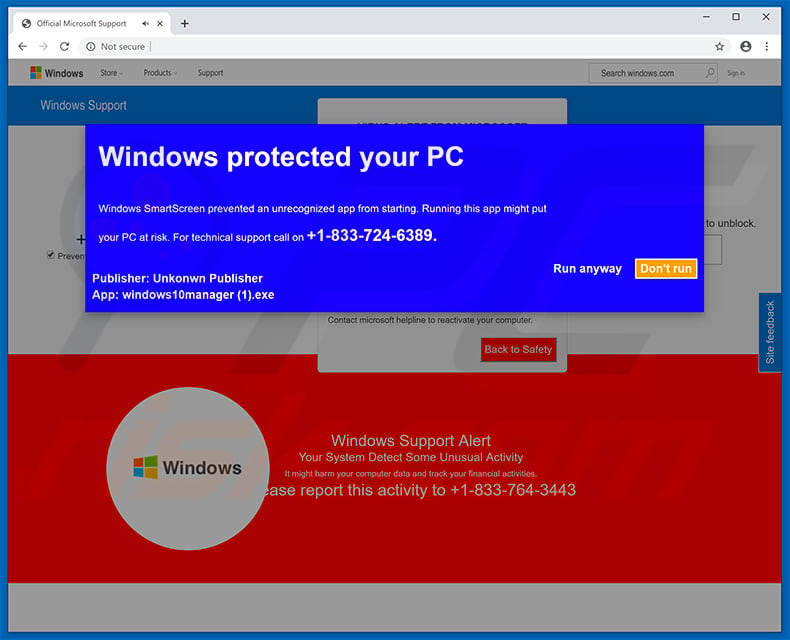
Another variant of this pop-up scam (the scam message is exactly the same, crooks only use a different telephone number - +1-833-779-4992):
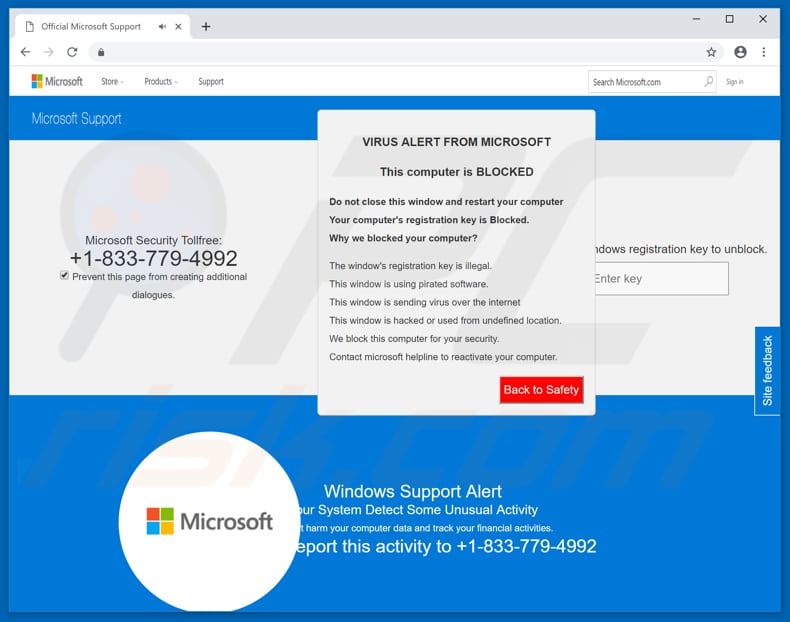
Text presented in the first "Windows protected your PC" pop-up:
VIRUS ALERT FROM MICROSOFT
This computer is BLOCKED
Do not close this window and restart your computer
Your computer's registration key is Blocked.
Why we blocked your computer?
The window's registration key is illegal.
The windows is using pirated software.
This window is sending virus over the Internet.
This window is hacked or used from undefined locations.
We block this computer for your security.
Contact microsoft helpline to reactivate your computer.
Windows Support Alert
Your System Detect Some Unusual Activity
Report this activity to +1-833-799-4992
Screenshot of this "Windows protected your PC" pop-up variant:
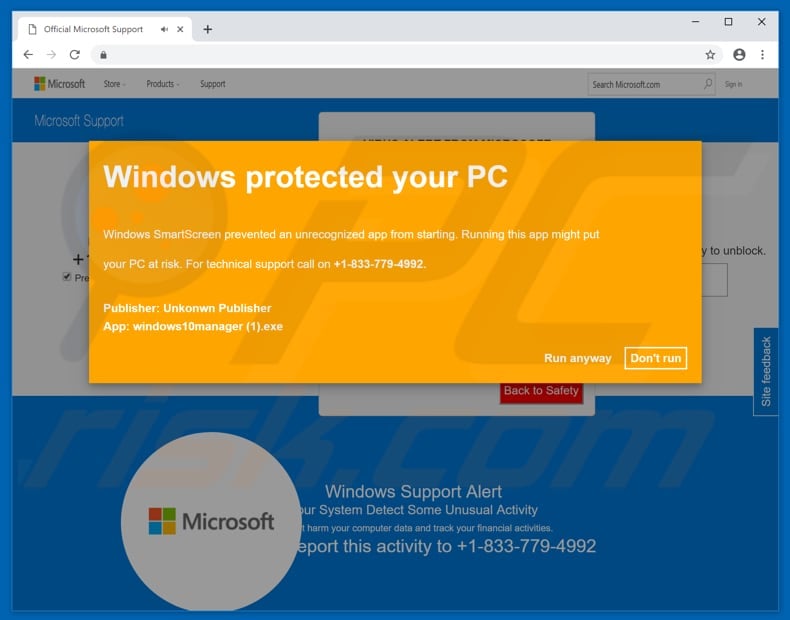
Text presented in this pop-up:
Windows protected your PC
Windows SmartScreen prevented an unrecognised app from starting. Running this app might put your PC at risk. For technical support call on +1-833-779-4992
Publisher: Unknown Publisher
App: windows10manager(1).exe
Run anyway Don't run
The appearance of this "Windows protected your PC" variant (GIF):
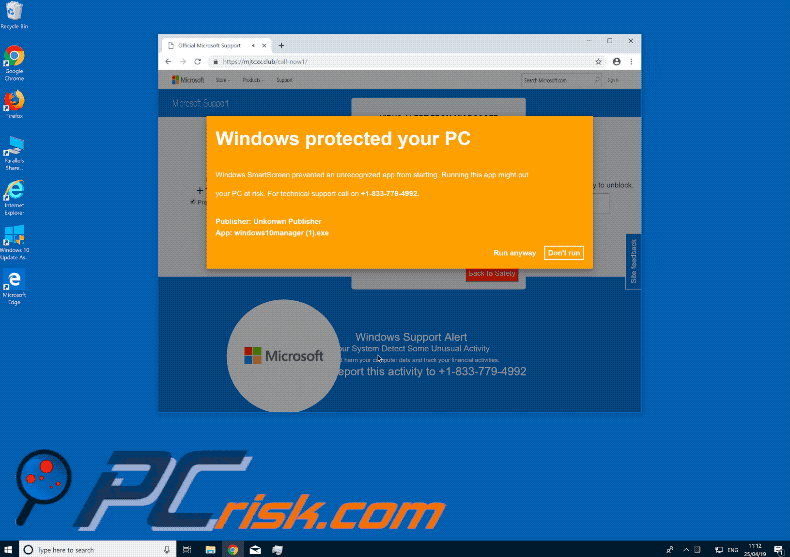
Yet another variant of "Windows Protected Your PC" pop-up scam:
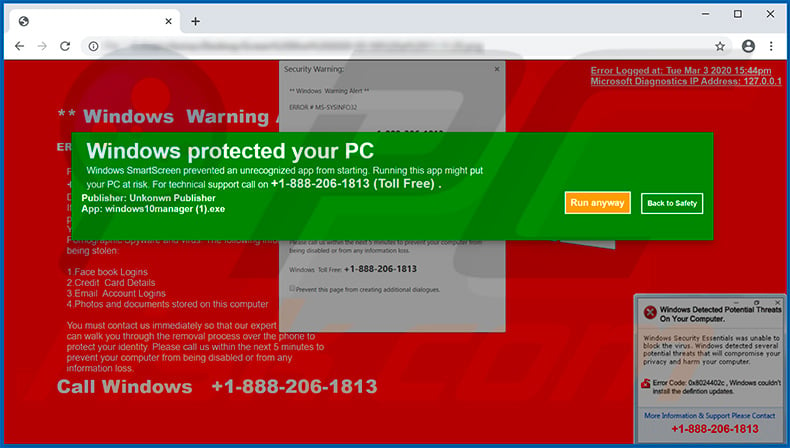
Text presented within this scam:
Windows protected your PC
Windows SmartScreen prevented an unrecognized app from starting. Running this app might put
your PC at risk. For technical support call +1-888-206-1813 (Toll Free) .
Publisher: Unknown Publisher
App: windows10manager (1).exe
Another variant of "Windows Protected Your PC" pop-up scam:
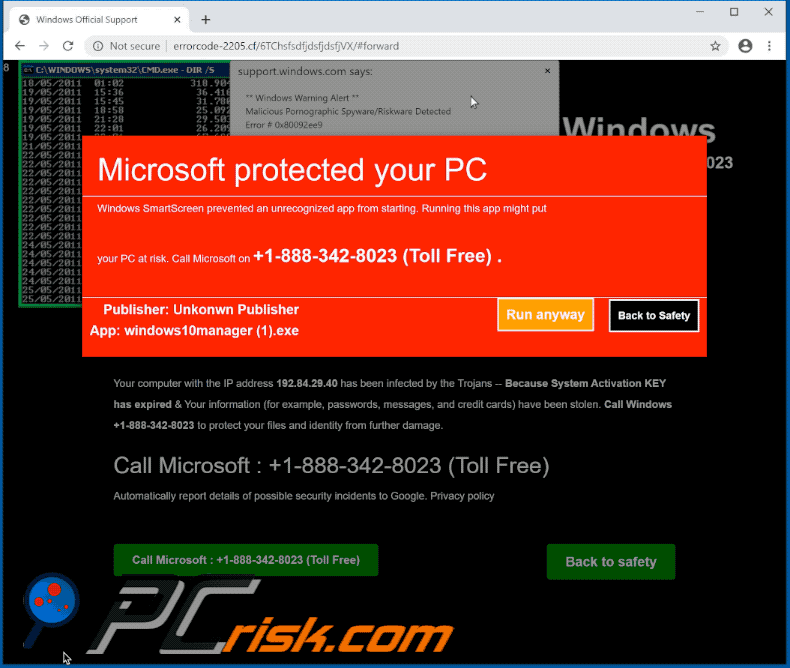
Instant automatic malware removal:
Manual threat removal might be a lengthy and complicated process that requires advanced IT skills. Combo Cleaner is a professional automatic malware removal tool that is recommended to get rid of malware. Download it by clicking the button below:
DOWNLOAD Combo CleanerBy downloading any software listed on this website you agree to our Privacy Policy and Terms of Use. To use full-featured product, you have to purchase a license for Combo Cleaner. 7 days free trial available. Combo Cleaner is owned and operated by RCS LT, the parent company of PCRisk.com.
Quick menu:
- What is "Windows protected your PC" virus?
- How to identify a pop-up scam?
- How do pop-up scams work?
- How to remove fake pop-ups?
- How to prevent fake pop-ups?
- What to do if you fell for a pop-up scam?
How to identify a pop-up scam?
Pop-up windows with various fake messages are a common type of lures cybercriminals use. They collect sensitive personal data, trick Internet users into calling fake tech support numbers, subscribe to useless online services, invest in shady cryptocurrency schemes, etc.
While in the majority of cases these pop-ups don't infect users' devices with malware, they can cause direct monetary loss or could result in identity theft.
Cybercriminals strive to create their rogue pop-up windows to look trustworthy, however, scams typically have the following characteristics:
- Spelling mistakes and non-professional images - Closely inspect the information displayed in a pop-up. Spelling mistakes and unprofessional images could be a sign of a scam.
- Sense of urgency - Countdown timer with a couple of minutes on it, asking you to enter your personal information or subscribe to some online service.
- Statements that you won something - If you haven't participated in a lottery, online competition, etc., and you see a pop-up window stating that you won.
- Computer or mobile device scan - A pop-up window that scans your device and informs of detected issues - is undoubtedly a scam; webpages cannot perform such actions.
- Exclusivity - Pop-up windows stating that only you are given secret access to a financial scheme that can quickly make you rich.
Example of a pop-up scam:

How do pop-up scams work?
Cybercriminals and deceptive marketers usually use various advertising networks, search engine poisoning techniques, and shady websites to generate traffic to their pop-ups. Users land on their online lures after clicking on fake download buttons, using a torrent website, or simply clicking on an Internet search engine result.
Based on users' location and device information, they are presented with a scam pop-up. Lures presented in such pop-ups range from get-rich-quick schemes to fake virus scans.
How to remove fake pop-ups?
In most cases, pop-up scams do not infect users' devices with malware. If you encountered a scam pop-up, simply closing it should be enough. In some cases scam, pop-ups may be hard to close; in such cases - close your Internet browser and restart it.
In extremely rare cases, you might need to reset your Internet browser. For this, use our instructions explaining how to reset Internet browser settings.
How to prevent fake pop-ups?
To prevent seeing pop-up scams, you should visit only reputable websites. Torrent, Crack, free online movie streaming, YouTube video download, and other websites of similar reputation commonly redirect Internet users to pop-up scams.
To minimize the risk of encountering pop-up scams, you should keep your Internet browsers up-to-date and use reputable anti-malware application. For this purpose, we recommend Combo Cleaner Antivirus for Windows.
What to do if you fell for a pop-up scam?
This depends on the type of scam that you fell for. Most commonly, pop-up scams try to trick users into sending money, giving away personal information, or giving access to one's device.
- If you sent money to scammers: You should contact your financial institution and explain that you were scammed. If informed promptly, there's a chance to get your money back.
- If you gave away your personal information: You should change your passwords and enable two-factor authentication in all online services that you use. Visit Federal Trade Commission to report identity theft and get personalized recovery steps.
- If you let scammers connect to your device: You should scan your computer with reputable anti-malware (we recommend Combo Cleaner Antivirus for Windows) - cyber criminals could have planted trojans, keyloggers, and other malware, don't use your computer until removing possible threats.
- Help other Internet users: report Internet scams to Federal Trade Commission.
Frequently Asked Questions (FAQ)
What is a pop-up scam?
Pop-up scams are deceptive messages. Their purpose is to deceive users into performing specific actions, e.g., calling fake helplines, allowing cyber criminals to access devices remotely, disclosing vulnerable information, making monetary transactions, downloading/installing software, purchasing products, and so forth.
What is the purpose of a pop-up scam?
Pop-up scams are designed to generate revenue. Cyber criminals profit primarily by obtaining funds through deception, selling or abusing vulnerable information, promoting content, and spreading malware.
Why do I encounter fake pop-ups?
Pop-up scams are run on deceptive webpages. Most visitors enter these sites using rogue advertising networks, mistyped URLs, spam browser notifications, intrusive ads, or installed adware.
I cannot exit a scam page, how do I close it?
In case you cannot exit a scam webpage, end the browser's process using Windows Task Manager. Since the previous browsing session includes the deceptive site, do not restore it.
I have allowed cyber criminals to remotely access my computer, what should I do?
If you've allowed cyber criminals to access your device remotely – first, disconnect it from the Internet. Second, remove the remote access program that was used (e.g., AnyDesk, UltraViewer, TeamViewer, etc.), as the criminals may not need your permission to reconnect. Last, run a full system scan and remove all detected threats.
I have provided my personal information when tricked by a pop-up scam, what should I do?
If you have provided your log-in credentials – change the passwords of all possibly exposed accounts and inform their official support. And if you've disclosed other private data (e.g., ID card details, passport scans/photos, credit card numbers, etc.) – contact relevant authorities.
Will Combo Cleaner protect me from pop-up scams and the malware they proliferate?
Combo Cleaner is designed to remove all manner of threats. It is capable of scanning visited websites and detecting deceptive/malicious ones. Should you access such a page – you will be warned immediately, and further access to it will be denied. Combo Cleaner can detect and eliminate nearly all known malware infections. Keep in mind that since high-end malicious software typically hides deep within systems – running a full system scan is crucial.
Share:

Tomas Meskauskas
Expert security researcher, professional malware analyst
I am passionate about computer security and technology. I have an experience of over 10 years working in various companies related to computer technical issue solving and Internet security. I have been working as an author and editor for pcrisk.com since 2010. Follow me on Twitter and LinkedIn to stay informed about the latest online security threats.
PCrisk security portal is brought by a company RCS LT.
Joined forces of security researchers help educate computer users about the latest online security threats. More information about the company RCS LT.
Our malware removal guides are free. However, if you want to support us you can send us a donation.
DonatePCrisk security portal is brought by a company RCS LT.
Joined forces of security researchers help educate computer users about the latest online security threats. More information about the company RCS LT.
Our malware removal guides are free. However, if you want to support us you can send us a donation.
Donate
▼ Show Discussion